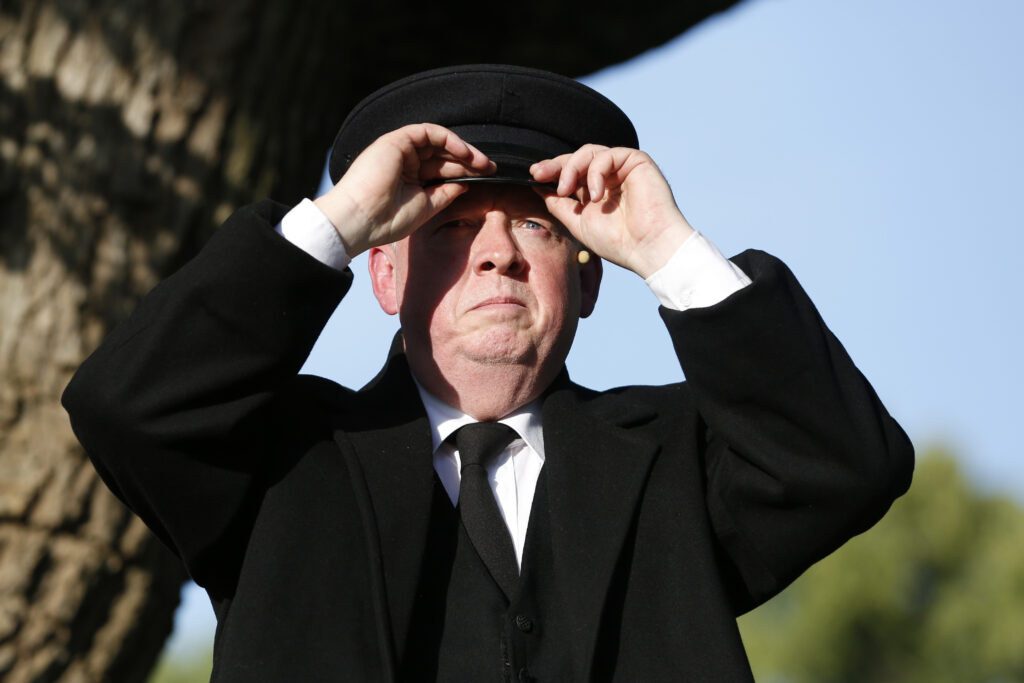Rowntree Park, York – until 17 July 2021
Reviewed by Sal E Marino
5*****
It’s not often I go to a production and during the applause announce – “I’m coming to see this again!” but that’s exactly what happened when I saw The Park Keeper, a play performed in Rowntree Park, York. My bubble guests agreed (who ranged from 75 to 13 years) and my young daughter, who is currently learning about the horrors of World War One said – “It really brought the fear of the men alive to me mum, I get it now!”. We all ‘got it’ and that was down to the absolutely outstanding and one hundred percent authentic portrayal of the character ‘Parky Bell’ (played by the fabulous Sean McKenzie) and the exceptional writing of Mike Kenny. Brought to us by Park Bench theatre, The Park Keeper is performed in the beautiful park grounds, where you will receive a most warm and covid-friendly welcome by the theatre staff. On arrival, you are provided with headphones and a device which allows you really clear access to the music and sound effects of the play that can be sometimes missed at outdoor performances.
Brilliantly directed by Matt Aston, the story of The Park Keeper is inspired by a real-life character known to the residents of York as ‘Parky Bell’. Parky Bell took this post when Messrs Rowntree & Co gifted Rowntree Park to the City of York as a memorial to the cocoa works staff who fell and suffered during the First World War. As he practises his retirement speech, we learn that it was through working in this park – a most beautiful flourishing and lush green space – that Bell could find some sort of solace (if that is at all possible) after his emotionally debilitating battlefield experiences. Before post traumatic stress disorder was recognised, men like Bell had to adopt the English ‘stiff upper lip’ and just get on with it but as we now know (and our beloved park keeper reveals) that’s just not possible.
A day on and I can’t stop thinking about ‘Parky Bell’ and what he’d endured as a young man during WW1. We’ve all seen Hollywood pictures and felt moved and affected by war on film but The Park Keeper – that doesn’t have the big budget movie style grandiose – brings home the catastrophic and overwhelming experience of warfare more than anything I’ve ever seen before! As said above, ‘authentic’ is a word I’d use to describe this performance but that’s not enough because it’s very deep. On the surface of it, Parky Bell doesn’t appear deep or complex at all but when he’s reliving the devastations of what the war has cost him: losing his best pal, being right in the-eye-of the storm of the bloodshed, surviving and then being sent right back into it – we clearly see the impact this has had on him. He’s been living with this hell and agony inside, privately, for all these years. He never talked to anyone about what happened because he didn’t see the point as how can those, ‘’who haven’t been through it’, understand? You have to go ‘deep’ with issues such as this and Mckenzie does it, geniously. Parky Bell ponders – ‘You’d have thought we’d have learnt’ (referring to the cruelties of war) but sadly not – as he later reveals the traumatising reality that his son was later lost in WW2. What’s even more impressive is that even though Sean Mckenzie addresses these topics through Bell with such an emotional and profound intensity, he also breaks things up with typical Yorkshire humour and uses phrases / sayings common to our parents and grandparents. It makes you smile.
As Parky opens up further he recalls his wife saying, ‘you’ve changed’ and he agrees. Things that don’t get talked about fester and then Bell questions whether his inability ‘to talk’ is responsible for his son’s death. Was his son, with whom he found so different in nature to himself (and who ‘wasn’t a fighter’) ‘trying to prove something to me’? The regret and soul searching Parky Bell explores regarding the difficult relationship between the two of them, no doubt due to his changed and emotionally defensive personality, is most moving to watch and you really feel the still-raw sadness, guilt and anger he holds.
The Park Keeper makes you question the meaning of life, the values of society and of ‘those in charge’ who make all the important decisions. These ‘important decisions’ can: shape, influence or determine one’s fate or fortune depending upon your social class and morals. We learn that the Rowntree family (who were ‘one of them’) most certainly did do-their-bit for the war effort and tragically lost a son. The gift of the park to the city, in the memory of their employees lost to the war, showed their sound ethics that Parky believes was true to their Quaker background. As with all brilliant plays, The Park Keeper questions the concepts of ‘hope’ and ‘faith’ in those who run and morally guide the country during his life-time (up to 1942) and it makes you question things today.
As the play comes to a close we are brought back to Parky Bell’s task at hand, which is to write his retirement speech and the love and respect now felt for this man overflows. Everything about this play is perfect – from the first-class writing, spectacular delivery of the script by Sean Mckenzie to the astounding beauty of the setting – the park itself. It makes you think, feel and then think some more and that’s really quite something!

